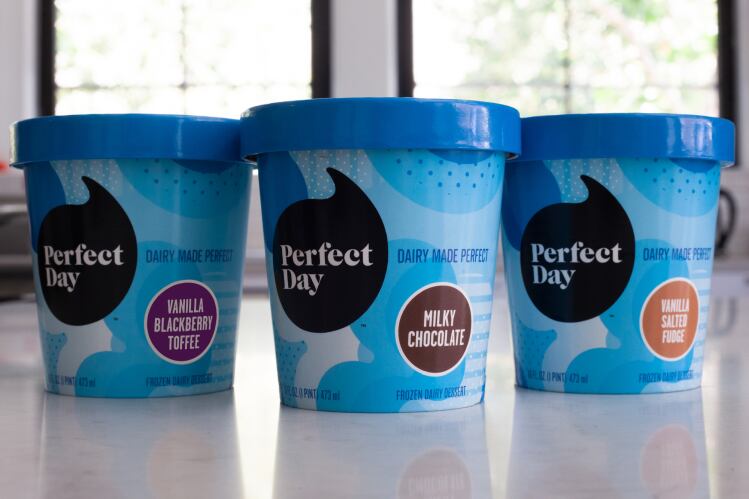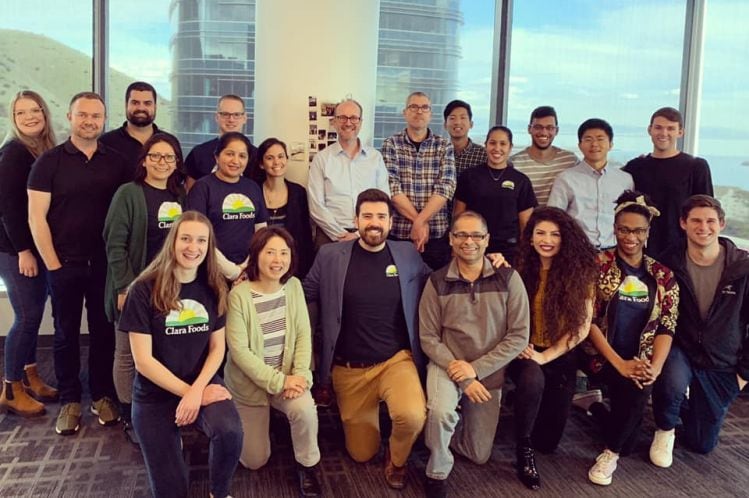A new wave of companies using a suite of engineered microorganisms (yeast, bacteria, fungi) capable of producing everything from collagen and gelatin (Geltor) to egg proteins (Clara Foods), heme proteins that can be used in plant-based meat (Impossible Foods, Triton Algae Innovations), milk proteins (Perfect Day, New Culture), proteins found in human breast milk (Triton), or a combination of these (Motif FoodWorks) in big fermentation tanks, could change the food industry as we know it, predicts RethinkX.*
“Precision fermentation is a process that enables the programming of micro-organisms to produce almost any complex organic molecule,” said the think tank, which was founded by Silicon Valley entrepreneur Tony Seba and tech investor Jamie Arbib to explore technologies with the potential to disrupt established industries.
“Due to rapid improvements in underlying biological and information technologies, the cost of precision fermentation development and production is dropping exponentially – from $1m per kilo in 2000 to about $100 today. Assuming existing technologies and using well-established cost curves, the report projects that these costs will fall to $10/kilo by 2023-25, and that these proteins will be five times cheaper than traditional animal proteins by 2030 and 10 times cheaper by 2035.”
Death by a thousand cuts?
By 2030, argues the report ‘Rethinking Food and Agriculture 2020-2030: The Second Domestication of Plants and Animals, the Disruption of the Cow, and the Collapse of Industrial Livestock Farming,’ “modern food products will cost less than half as much to produce as the animal-derived products they replace.
“By 2030 the market for ground beef by volume will have shrunk by 70%, steak market by 30% and dairy market by almost 90%. The markets for other cow products (leather, collagen, etc.) are likely to decline more than 90%. All together, demand for cow products will fall by more than 50%.”
Instead of growing a whole cow to break it down into products, precision fermentation designs the most efficient process to produce just the parts we need, which can be produced from a distibuted network of local production facilities using a fraction of the land, water, and inputs required to raise, feed and slaughter animals, it explained.
The resulting ingredients have the added appeal of consistent quality, a lack of price volatility, and security of supply, it added. "By 2030, we expect almost 90% of US dairy protein demand to come from precision fermentation alternatives."
A death spiral
As leather, collagen, milk and meat face competition from nature-identical analogs produced via microbial fermentation, demand for cow products will decrease, claim the authors, “triggering a death spiral of increasing prices for the industrial livestock industry, decreasing demand and reversing economies of scale.”
As for cell-cultured meat, “Industrial cattle farming industry will collapse long before we see modern technologies produce the ‘perfect’ cellular steak at a competitive price,” they argue.
“Projections are just that,” acknowledged RethinkX co-founder Jamie Arbib. “But we believe our framework, methodology and findings are more accurate than those produced by linear models, which risk locking in expensive, obsolete, and uncompetitive assets, technologies and skill sets.”
"The current industrialized, animal-agriculture system will be replaced with a Food-as-Software model, where foods are engineered by scientists at a molecular level and uploaded to databases that can be accessed by food designers anywhere in the world. This will result in a far more distributed, localized food-production system that is more stable and resilient than the one it replaces.
"The new production system will be shielded from volume and price volatility due to the vagaries of seasonality, weather, drought, disease and other natural, economic, and political factors. Geography will no longer offer any competitive advantage. We will move from a centralized system dependent on scarce resources to a distributed system based on abundant resources."

New Crop Capital, Unovis Partners: No accident that Tyson is calling itself a 'protein' company
So what do industry stakeholders and other commentators make of these bold predictions?
Dan Altschuler Malek, managing partner at Unovis Partners’ New Crop Capital venture fund – which has invested in companies in plant-based, cell-cultured or ‘cultivated’ meat, and proteins produced via microbial fermentation – said no one can predict with certainty what the food system will be like in 2030 or 2035, but said all three approaches had the potential to be disruptive.
"I don't believe in a winner takes all, whether it's companies or sources of protein or technologies. I also think geographically things will play out differently [depending on] consumer tastes and culinary heritage," he said, noting that, much will also depend on "infrastructure, purchasing power, and crop availability. But what's very exciting is that big players are making bold strategic decisions to get into this space."
It is also significant that some of the world's biggest meat companies - which have invested in plant-based and cell-cultured meat - are increasingly describing themselves as 'protein' companies, he added.
Asked whether growing animal proteins using engineered microbes in big fermentation tanks ran contrary to consumers' desire to return to traditional methods of food production, he noted that bucolic images of small farms often presented by food companies are a far cry from the realities of factory farming, while lots of things consumers already eat, from beer to yogurts are already produced using fermentation.
GFI: Some proteins from fungal strains require little or no purification
Good Food Institute (GFI) associate director of science and technology Dr Liz Specht - who the authors thank in their acknowledgements - noted in a blog post that the transition predicted in the report is "far from inevitable," but said similarly accelerated transitions are not without precedent in the industry, citing the switch from small scale farms to consolidated industrial farming, which "happened within a single generation."
She also noted that fermentation-derived ingredients or enzymes can enable or enhance the utilization of other non-animal-derived raw materials, hastening the cost curve progression of both plant-based meat an cell cultured or 'cultivated' meat.
As for microbial protein sources that can serve as meat substitutes, she added: "While Quorn was the only company in this sector for decades, we have now seen companies like Prime Roots, Sustainable Bioproducts, Emergy, and Atlast emerge. The edible fungal strains these companies are working with could be used as the starting point for 'precision fermentation,' resulting in a product that requires little or no purification."

NMPF: Authors are living in ‘a vegan fantasyland’
The North American Meat Institute did not respond to requests for comment, but the National Milk Producers Federation said the authors were living in a "vegan fantasyland.”
A spokesman added: “This study will be a millstone around the neck of the fake-foods lobby.
"This report would have you believe that in 11 short years we will be living in The Jetsons, with consumers massively adopting industrially developed, untested food-like products on their way to vegan fantasyland. In reality, US dairy is part of the sustainability solution: our greenhouse-gas emissions have fallen in absolute terms since 2005, and we are committed to further reductions.”
While fluid milk consumption is declining, he added, overall dairy last year “saw its highest per-capita demand in the US since 1962, hardly the sign of a dying industry. We can’t wait to prove the authors wrong.”
Jack Bobo: ‘Incredibly unlikely that this will happen in the timeframe they describe’
Jack Bobo, who spent 13 years in the State Department working on global food policy and now runs Futurity, a consultancy at the intersection of food and technology, told FoodNavigator-USA that while precision fermentation was potentially disruptive, it was “incredibly unlikely that this [the collapse of the US dairy and cattle industry] will happen in the timeframe they describe.”
He added: “Not even the companies in this space are suggesting they can scale at that speed."
‘Big food’ and technology: ‘Imagine if Monsanto had come up with the Impossible Burger’
As to whether consumers will accept the next generation of ingredients produced via microbial fermentation (many colors, vitamins, flavors, sweeteners and enzymes are already produced this way - although consumers are largely unaware of this), he said, much will depend on how they view the companies producing them.
Right now, the pioneers in the space (Geltor, Clara Foods, Perfect Day, New Culture, MotifFoodworks, Sustainable Bioproducts) are small, sexy, mission-driven startups.
For ‘precision fermentation’ to truly disrupt traditional agriculture, however, they will either have to partner with big food or ingredient companies (and some already have) or they will become big food or ingredient companies themselves, and could then be viewed differently by consumers, predicted Bobo.
“A lot of this has to do with the fact that consumers don’t want innovation to come from ‘Big Food.’ Imagine if Monsanto had come up with the Impossible Burger [which uses soy from GM crops as its core protein source and heme from a genetically engineered microbe as its star ingredient]. Every paper would say, 'No one in the world will buy a GMO burger, what were they thinking?'
“But Impossible Foods was seen differently when it launched because it was small. Now they are in Burger King and as they grow, they will no longer be seen as a small player, and the underlying [PR] problems [around ‘processed foods’ and GMOs] that didn’t matter when they were a smaller company might absolutely matter in the future.”
‘It’s very easy to describe this technology in a way that makes it seem pretty unappetizing’
Presenting proteins produced ultra-efficiently in big tanks via microbial fermentation as cheap commodities that will undercut conventionally produced meat and dairy, could also backfire, he warned, given that initially at least, companies will want to present them as premium products.
“Foodies who could be early adopters could also reject it [if the communication strategy is not carefully managed] as it’s very easy to describe this technology in a way that makes it seem pretty unappetizing.”
*Learn more about RethinkX, an independent think tank that analyzes and forecasts the scope, speed and scale of technology-driven disruption and its implications across society.




